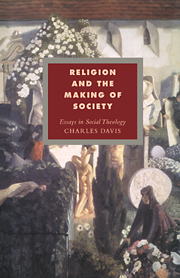Book contents
- Frontmatter
- Contents
- General editors' preface
- Acknowledgements
- Introduction: from the secular to the supernatural
- PART I Society, religion and human agency
- 1 Society and the critique of modernity
- 2 The present social function of religion
- 3 From inwardness to social action: the transformation of the political
- 4 The Christian question to radicalism
- PART II Praxis, narrative and religious language
- PART III From the modern subject to the postmodern self
- PART IV The option for the future
- Index
- Cambridge Studies In Ideology And Religion
3 - From inwardness to social action: the transformation of the political
Published online by Cambridge University Press: 18 December 2009
- Frontmatter
- Contents
- General editors' preface
- Acknowledgements
- Introduction: from the secular to the supernatural
- PART I Society, religion and human agency
- 1 Society and the critique of modernity
- 2 The present social function of religion
- 3 From inwardness to social action: the transformation of the political
- 4 The Christian question to radicalism
- PART II Praxis, narrative and religious language
- PART III From the modern subject to the postmodern self
- PART IV The option for the future
- Index
- Cambridge Studies In Ideology And Religion
Summary
There is now general agreement that Christians, by virtue of their Christian commitment, should engage in social and political action, particularly on behalf of the poor and oppressed. That is the presupposition behind Liberation Theology. At the same time the conviction persists that social and political action is not properly religious action, but, strictly speaking, only the consequence or overflow of religion into a non-religious, secular sphere. Hence the felt necessity, especially on the part of those with religious authority, to qualify the acceptance of Liberation Theology with frequent warnings that the Christian religion should not be reduced to social and political action.
More widespread among ordinary religious people is the manner in which the perennial need for reflection becomes a devaluing of social and political action in favour of interior contemplation as alone truly religious. People are urged to withdraw at regular intervals from their social involvement, which is dubbed external activity, in order to find God once more in the properly religious activity of personal, meditative prayer. The religious life is seen as the inner life in contrast to the outer life. The locus of the Transcendent and of religious experience is identified with the realm of interiority. To work for the liberation of the poor and oppressed may be demanded by religious faith, hope and love. It is applied religion, but it is not of the essence of religion, which is found in the inwardness of union with God.
This tendency of the Christian religion has been strongly reinforced by interest in the Eastern religions.
- Type
- Chapter
- Information
- Religion and the Making of SocietyEssays in Social Theology, pp. 48 - 62Publisher: Cambridge University PressPrint publication year: 1993



